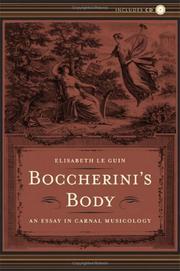| Listing 1 - 2 of 2 |
Sort by
|

ISBN: 1282759264 9786612759260 0520930622 1598759191 9780520930629 1423745434 9781423745433 9781598759198 0520240170 9780520240179 9781282759268 6612759267 Year: 2006 Publisher: Berkeley
Abstract | Keywords | Export | Availability | Bookmark
 Loading...
Loading...Choose an application
- Reference Manager
- EndNote
- RefWorks (Direct export to RefWorks)
In this elegant study of the works of the undeservedly neglected composer Luigi Boccherini, Elisabeth Le Guin uses knowledge gleaned from her own playing of the cello as the keystone of her original approach to the relationship between music and embodiment. In analyzing the striking qualities of Boccherini's music-its virtuosity, repetitiveness, obsessively nuanced dynamics, delicate sonorities, and rich palette of melancholy affects-Le Guin develops a historicized critical method based on the embodied experience of the performer. In the process, she redefines the temperament of the musical Enlightenment as one characterized by urgent, volatile inquiries into the nature of the self. A CD of sound examples, performed by the author and her string quartet, is included with the book.
Music --- Articulation (Music) --- Dynamics (Music) --- Interpretation, Musical --- Musical interpretation --- Phrasing (Music) --- Interpretation (Phrasing, dynamics, etc.) --- Dynamics, phrasing --- Phrasing, dynamics --- Performance --- Boccherini, Luigi, --- Bokkerini, Luidzhi, --- Bokerinis, L., --- Boccherini, --- Boccherrini, Luigi, --- Boccerini, Luigi, --- Bokkerini, L. --- Boccherini, L. --- Buccarini, Luigi, --- Bucarini, --- Buccharini, Luigi, --- Bocherini, Luigi, --- Boccherini, Ridolfo Luigi, --- Criticism and interpretation. --- Interpretation (Phrasing, dynamics, etc.). --- Boccherini, Luigi --- affect theory. --- allegro. --- angiolini. --- biography. --- boccherini. --- cello sonata. --- cello. --- cherini. --- classical music. --- composers. --- consumption. --- depression. --- drama. --- embodiment. --- emotion. --- history of medicine. --- instrumental music. --- kinesthesia. --- melancholy. --- mental illness. --- mind and body. --- music history. --- music theory. --- music. --- musical dynamics. --- musician. --- musicians. --- musicology. --- nonfiction. --- performing arts. --- popular culture. --- sensation. --- solipsism. --- string quartet. --- theater. --- theatrical music. --- tuberculosis. --- virtuoso.
Book
ISBN: 0520956907 9780520956902 1299981690 9781299981690 9780520276307 0520276302 Year: 2014 Publisher: Berkeley University of California Press
Abstract | Keywords | Export | Availability | Bookmark
 Loading...
Loading...Choose an application
- Reference Manager
- EndNote
- RefWorks (Direct export to RefWorks)
The tonadilla, a type of satiric musical skit popular on the public stages of Madrid during the late Enlightenment, has played a significant role in the history of music in Spain. This book, the first major study of the tonadilla in English, examines the musical, theatrical, and social worlds that the tonadilla brought together and traces the lasting influence this genre has had on the historiography of Spanish music. The tonadillas' careful constructions of musical populism provide a window onto the tensions among Enlightenment modernity, folkloric nationalism, and the politics of representation; their diverse, engaging, and cosmopolitan music is an invitation to reexamine tired old ideas of musical "Spanishness." Perhaps most radically of all, their satirical stance urges us to embrace the labile, paratextual nature of comic performance as central to the construction of history.
Tonadillas --- Operas --- Burlettas --- Comic operas --- Intermezzos (Operas) --- Light operas --- Opera buffas --- Opera serias --- Opéras comiques --- Operettas --- Puppet operas --- Singspiels --- Dramatic music --- Tonadilla --- History and criticism. --- Music --- History and criticism --- Histoire et critique --- actors. --- comic performance. --- cosmopolitan music. --- dance. --- dancers. --- engaging. --- folklore. --- folkloric nationalism. --- history of music. --- history of spain. --- history. --- madrid. --- music. --- musical genres. --- musical populism. --- musical. --- performing arts. --- politics of representation. --- public stages. --- satiric musical skit. --- social worlds. --- spain. --- spanish history. --- spanish music. --- the enlightenment. --- tonadilla.
| Listing 1 - 2 of 2 |
Sort by
|

 Search
Search Feedback
Feedback About UniCat
About UniCat  Help
Help News
News